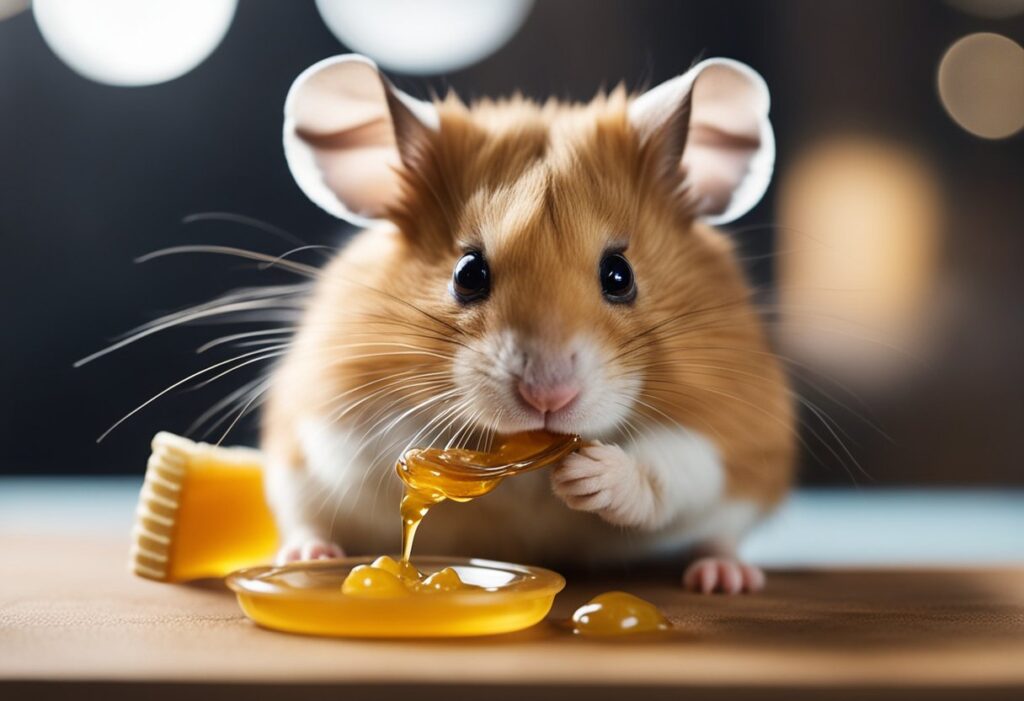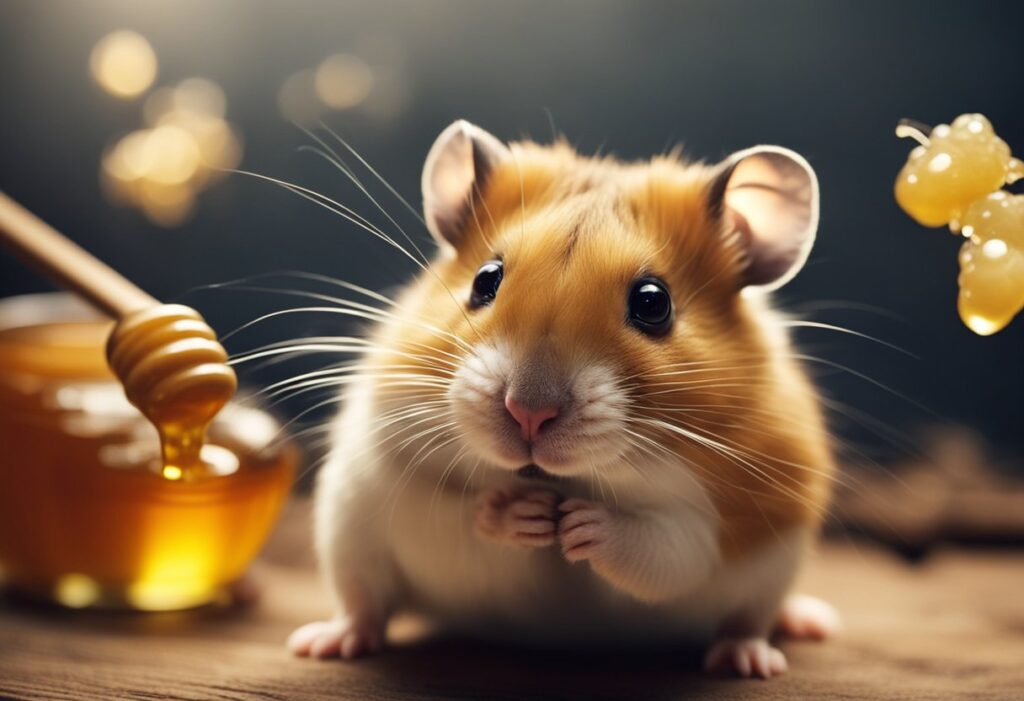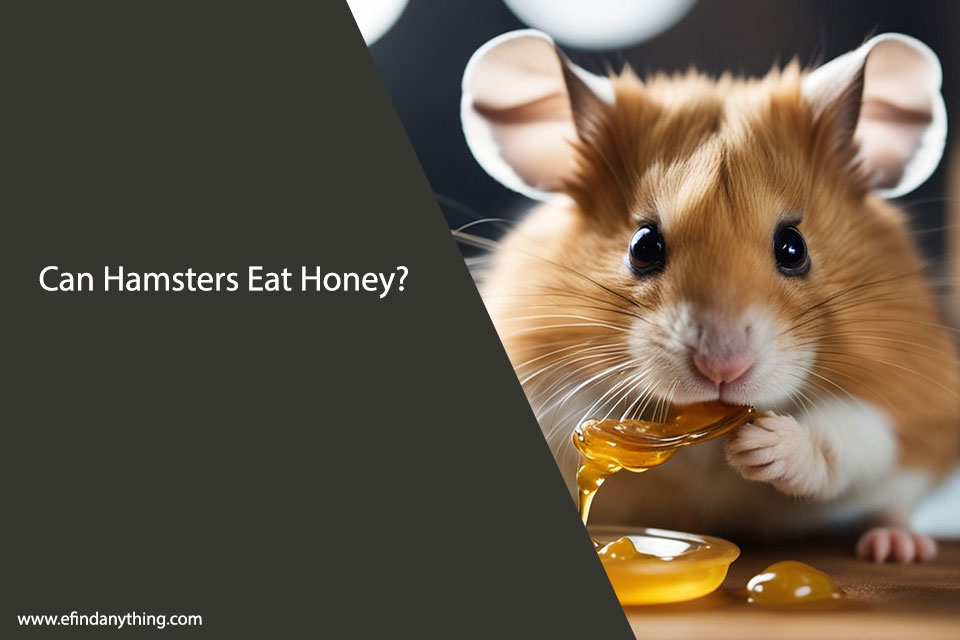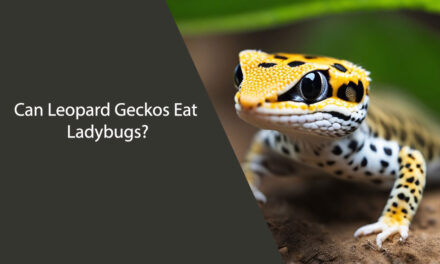Hamsters are adorable little creatures that make great pets. They are small, furry, and have a playful personality that makes them popular among pet owners. However, when it comes to their diet, there are certain foods that hamsters can and cannot eat. One of the questions that many hamster owners have is whether or not their furry friend can eat honey.

Honey is a sweet, viscous substance that is produced by bees. It is a popular natural sweetener that is used in many foods and drinks. While honey is safe for humans to consume, it is important to know whether or not it is safe for hamsters. Hamsters have a delicate digestive system, and it is important to be careful about what they eat. Therefore, it is important to understand if honey is a safe food for hamsters to consume, and if so, how much they can safely eat.
Table of Contents
Can Hamsters Eat Honey

Hamsters are known for their love of sweet treats, but can they eat honey? The answer is yes, in moderation.
Honey is a natural sweetener that can be a healthy addition to a hamster’s diet. It contains antioxidants and has antimicrobial properties that can benefit their overall health. However, it’s important to note that honey is high in sugar and should only be given to hamsters in small amounts.
Too much sugar can lead to weight gain and other health issues such as diabetes. Therefore, it’s recommended to give hamsters no more than a small drop of honey as an occasional treat.
It’s also important to make sure that the honey is pure and free from any additives or preservatives. Raw, organic honey is the best option for hamsters as it contains more nutrients and is free from harmful chemicals.
In summary, hamsters can eat honey in moderation as a sweet treat. However, it’s important to limit their intake and choose pure, organic honey to ensure their overall health and well-being.
Nutritional Profile of Honey

Sugar Content in Honey
Honey is a natural sweetener that is composed of approximately 80% carbohydrates, mainly in the form of sugars such as fructose and glucose. The sugar content in honey varies depending on the type of flower nectar collected by bees. On average, one tablespoon of honey contains 17 grams of carbohydrates and 64 calories.
Vitamins and Minerals
Honey contains trace amounts of vitamins and minerals, including vitamin C, calcium, and iron. However, the amounts present are not significant enough to provide a significant nutritional benefit.
Potential Allergens
Honey is known to cause allergic reactions in some individuals, particularly those with pollen allergies. The allergens in honey can cause symptoms such as itching, swelling, and hives. It is recommended that individuals with allergies to pollen or bee stings avoid consuming honey.
In summary, while honey can provide a natural sweetener option, it should be consumed in moderation due to its high sugar content. Additionally, individuals with allergies to pollen or bee stings should exercise caution when consuming honey.
Hamster Dietary Requirements
Hamsters are small rodents that require a balanced diet to maintain good health. A proper diet for hamsters should consist of a mix of high-quality pellet food, fresh vegetables, and occasional treats.
General Hamster Diet
Hamsters require a diet that is high in protein and fiber, with moderate fat content. Commercially available hamster pellets are a good source of nutrition and should make up the bulk of a hamster’s diet. Fresh vegetables such as carrots, broccoli, and spinach can be added to the diet to provide additional nutrients and fiber.
It is important to avoid feeding hamsters sugary or fatty foods, as these can cause health problems such as obesity and diabetes. Additionally, hamsters should always have access to fresh water, which should be changed daily.
Safe Treats for Hamsters
While hamsters enjoy treats, it is important to choose treats that are safe and healthy. Treats such as fresh fruit, cooked eggs, and small amounts of cooked meat can be given occasionally. However, it is important to avoid feeding hamsters chocolate, candy, or other sugary treats, as these can cause health problems.
Another treat that is often given to hamsters is honey. While honey is a natural sweetener and has some health benefits, it is not recommended as a regular part of a hamster’s diet. Honey is high in sugar and can cause health problems if given in excess. Additionally, some types of honey may contain harmful bacteria that can make a hamster sick.
In conclusion, hamsters require a balanced diet that is high in protein and fiber, with moderate fat content. Fresh vegetables and occasional treats can be added to the diet to provide additional nutrients and variety. However, it is important to choose treats that are safe and healthy, and to avoid feeding hamsters sugary or fatty foods.
Benefits and Risks of Honey for Hamsters
Possible Health Benefits
Honey is a natural sweetener that is packed with nutrients. It contains vitamins, minerals, and antioxidants that can help boost the immune system and promote overall health. For hamsters, honey can provide some potential health benefits, such as:
- Energy Boost: Honey is a great source of carbohydrates, which can provide a quick energy boost for hamsters.
- Digestive Aid: Honey contains enzymes that can help improve digestion and prevent digestive issues in hamsters.
- Wound Healing: Honey has antibacterial properties that can help prevent infection and promote wound healing in hamsters.
Risks and Concerns
While honey can provide some potential health benefits for hamsters, it is important to be aware of the risks and concerns associated with feeding honey to hamsters:
- High Sugar Content: Honey is high in sugar, which can lead to obesity and other health issues in hamsters if consumed in excess.
- Botulism Risk: Honey can contain spores of Clostridium botulinum, which can cause botulism in hamsters. It is important to only feed small amounts of honey and monitor hamsters closely for any signs of illness.
- Allergic Reactions: Some hamsters may be allergic to honey, which can cause skin irritation, respiratory issues, and other allergic reactions.
Overall, while honey can provide some potential health benefits for hamsters, it should only be fed in moderation and with caution. It is always best to consult with a veterinarian before introducing any new foods to a hamster’s diet.
Feeding Honey to Hamsters
Hamsters are known for their love of sweet treats, but not all sweet foods are safe for them to eat. One such food is honey. While honey is a natural and healthy sweetener for humans, it may not be the best choice for hamsters.
Appropriate Quantities
Hamsters have small digestive systems, and feeding them too much honey can cause digestive issues such as diarrhea and bloating. Therefore, it is important to feed honey to hamsters in appropriate quantities. A small amount of honey, about half a teaspoon, can be given to a hamster as an occasional treat. It is important to note that honey should never be a staple in a hamster’s diet.
Frequency of Feeding
Feeding honey to hamsters should be done sparingly, no more than once a week. Hamsters have a tendency to overeat sweet foods, which can lead to obesity and other health problems. It is important to monitor the amount of honey a hamster consumes and to limit their intake accordingly.
In conclusion, while honey can be a tasty treat for humans, it is not the best choice for hamsters. Feeding honey to hamsters should be done in appropriate quantities and frequency to prevent any digestive issues or health problems.
Alternatives to Honey
While honey is a sweet treat that hamsters may enjoy, it is not necessary for their diet and may even be harmful in excess. Fortunately, there are plenty of other healthy treats that hamsters can enjoy.
Healthy Hamster Treats
Here are some alternatives to honey that hamster owners may consider:
- Fresh fruits and vegetables: Hamsters can safely eat a variety of fruits and vegetables, such as apples, carrots, and cucumbers. These treats provide important vitamins and minerals that hamsters need to stay healthy.
- Seeds and nuts: Hamsters love seeds and nuts, but they should be given in moderation due to their high fat content. Sunflower seeds, pumpkin seeds, and almonds are all good options.
- Whole grains: Hamsters can enjoy small amounts of cooked whole grains, such as brown rice or quinoa. These treats provide fiber and other important nutrients.
It is important to note that treats should only make up a small portion of a hamster’s diet. The majority of their diet should consist of a high-quality hamster food that is specifically formulated to meet their nutritional needs.
By offering a variety of healthy treats in moderation, hamster owners can provide their pets with a balanced and enjoyable diet.
Frequently Asked Questions
Is honey safe for hamsters to consume?
Yes, honey is safe for hamsters to consume in small amounts. However, it should not be a regular part of their diet as it is high in sugar and can cause obesity and dental problems.
Can hamsters have dairy products like milk?
Hamsters are lactose intolerant and cannot digest dairy products like milk properly. It is best to avoid feeding them any dairy products.
Are Honey Nut Cheerios an appropriate snack for hamsters?
Honey Nut Cheerios should not be fed to hamsters as they contain high amounts of sugar and artificial additives. It is best to stick to natural, unprocessed foods for your hamster.
Is it safe for hamsters to eat honeydew melon?
Yes, honeydew melon is safe for hamsters to eat in small amounts. It is a good source of vitamins and minerals and can be a healthy addition to their diet.
What are the risks of feeding peanut butter to hamsters?
Peanut butter is high in fat and can cause obesity and digestive problems in hamsters. It is best to avoid feeding them peanut butter or any other high-fat foods.
Which foods are considered toxic to hamsters?
Some foods that are toxic to hamsters include chocolate, caffeine, onions, garlic, avocado, and citrus fruits. It is important to avoid feeding them these foods as they can cause serious health problems.





